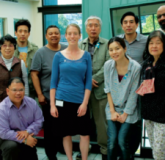The Mockingbird Family Model Project is moving forward in Japan!
- 2013-10-10
- All News, Caregivers

IFCA’s other objective is to generate opportunities for the US and Japan’s caregivers and child welfare professionals to exchange ideas to better the system for protecting our children.
Following this objective, IFCA has been informing Japanese foster parent leaders and child welfare professionals about an effective American caregiver support method called the Mockingbird Family Model (MFM). Since the beginning of 2012, IFCA’s founder traveled to Japan several times and held study groups on MFM. As a result, in May 2013, a Japanese delegation visited the US and learned MFM in depth. Currently, this project is about to reach its milestone goal of launching the first MFM pilot project in Japan. Before giving the full account on the project progress, let me explain the foster care reality in Japan, and the basic construct of the Mockingbird Family Model.
Foster Care Reality in Japan: Currently, there are 45,000 foster children in Japan. Of these children only 10% live in foster homes. (2010 data) Most children in need of government care, ages 2 through 18, live in baby nurseries, and large-scale residential facilities. Japan has received criticism from the international child welfare community about its child placement practice and is currently being pressured to change the system and to move foster children from institutions to foster homes. The goal is to increase the percentage of children in foster homes from the current 10% to 16% by 2014. Robust and innovative foster parent support and recruitment methods are needed in Japan more than ever.
What is the Mockingbird Family Model (MFM)?: Established by the Mockingbird Society, a non-profit organization based in Seattle, MFM is one of the most remarkable foster parent support and recruitment methods in the U.S. To construct a support network of caregivers, a very experienced foster family called a “hub home” is selected. The hub home foster parents guide and support 6 to 10 foster/kinship families (“satellite families”) and have two empty beds in their home for impromptu and emergency respite care 24/7. When there is a crisis in a satellite home, the hub home goes to the satellite home to help. To foster teamwork, the hub home also opens up their home for monthly meetings and, training for satellite foster parents. The model’s efficacy has been proven by multiple studies.
In the week long study tour in Seattle, the 7-member Japanese delegation team visited representative MFM constellations, spoke with a foster care alumni who grew up in an MFM constellation, and had an in-depth discussion and consultation with the Mockingbird Society founder and consultants.
In June 2013, the delegation members formed a committee named the Mockingbird Family Model-Japan (MFM-J). After several internal meetings, MFM-J held its first public workshop in Tokyo in August to report their findings from their US trip. Most recently, at the September Osaka IFCO Conference, MFM-J held a workshop with help from IFCA. Among the 120 workshop participants from all over Japan, several regional foster care and governmental leaders showed their interests in disseminating this model in their local communities.
IFCA and MFM-J believe that MFM will be effective in reducing the number of children in institutional settings. MFM’s strength in timely reunification/permanency would bring confidence to the Japanese child placement practice.
Because of IFCA and MSM-J’s efforts to communicate the benefits of implementing a truly child-centered practice, many Japanese foster parents and foster care professionals now share this common vision.





